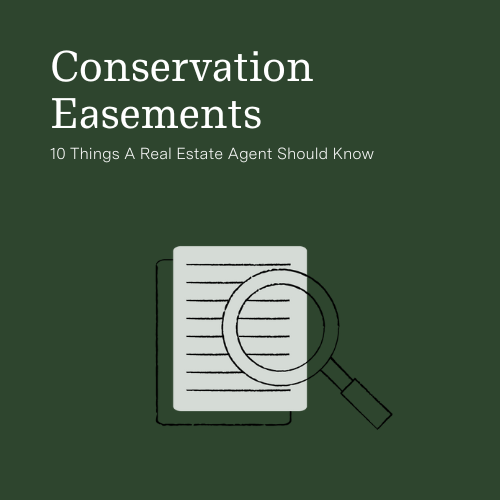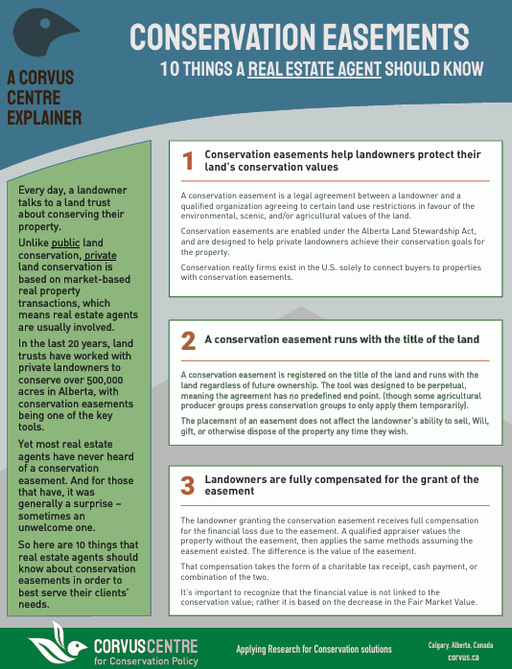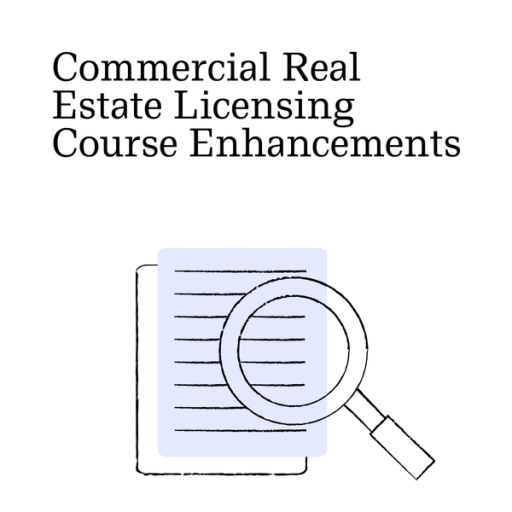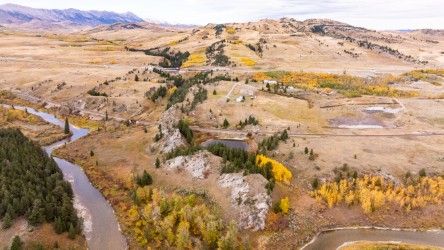March 31, 2025
Conservation Easements: Ten Things a Real Estate Agent Should to Know
By Corvus Conservation

Most real estate agents have not heard of a conservation easement. Of those that have, many see them as simply a barrier to the land-use wishes of their buying client. However, real estate agents are regularly approached by people wanting to buy or sell a property with a conservation easement. When that happens, the reality of conservation easements becomes a little more complex.
That scenario is more common than one might think.
In Alberta, thousands of landowners have placed conservation easements on tens of thousands of acres. Real estate agents – especially rural real estate agents – have played a critical role in these real property transactions.
So what should a real estate agent know about conservation easements?
The Corvus Centre for Conservation Policy has created a new, free publication targeted to real estate agents to help them understand what they should know when helping clients navigate the world of conservation easements. Conservation Easements: Ten Things a Real Estate Agent Should toKnow – made possible through a grant from the Alberta Real Estate Foundation – is a basic explainer on the topic informed by the experience of real estate agents who have dealt with conservation easements.
What is a conservation easement?
Briefly put, a conservation easement is a voluntary agreement between a landowner and a ‘qualified organization’ that applies certain restrictions and requirements on land use in favour of specific types of conservation (environmental, agricultural, and/or scenic). It Is placed on the title, runs with the land, and is usually perpetual.
Those ‘qualified organizations’ are generally not-for-profit charities with a land conservation mandate (though provincial and municipal governments can hold conservation easements, too).
When an easement is granted, the restrictions will generally lower the speculative or fair market value of the land (the highest amount it could garner on an open market). The landowner receives full compensation for that amount, which can be via a cash payment, charitable tax receipt, or a combination of the two.
Why would a landowner choose to ‘de-value’ their property?
That depends on what you mean by ‘value.’
While the financial value may decrease, the conservation value is retained. This means a conservation easement is not for everyone; only those seeking a way to perpetually conserve the ecological, agricultural, and/or scenic values of a property they care strongly about would enter into such an agreement. But remember, the landowner also receives full compensation for that lost financial value.
Like any real estate transaction, it is all about understanding the client’s motivations.
And as with any real estate transaction, that’s where it gets complex and messy.
What should I know if my client asks about conservation easements?
hat is the question at the centre of Conservation Easements: What a Real Estate Professional Needs to Know.
The guide is not a comprehensive resource, butidentifies key knowledge needs for real estate agents around what you should I know if your client wants to buy a property with a conservation easement, or if they want to grant a conservation easement.
The guide also contains contact information for the ‘qualified organizations’ in Alberta. And if you still have questions, you can always contact the author at the Corvus Centre for Conservation Policy, Guy Greenaway, at guy@corvus.ca.
Topic
Contributor

Corvus Conservation
The Corvus Centre for Conservation Policy is a not-for-profit, charitable organization whose vision is that public policy actively supports nature and biodiversity.
Similar News



